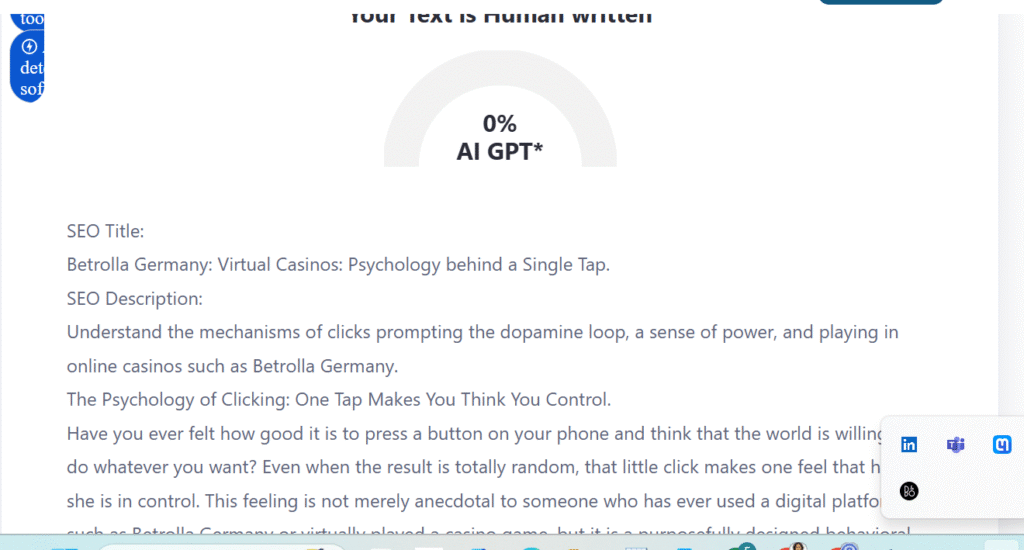The Psychology of Clicking: One Tap Makes You Think You Control.

Have you ever felt how good it is to press a button on your phone and think that the world is willing to do whatever you want? Even when the result is totally random, that little click makes one feel that they are in control. This feeling is not merely anecdotal to someone who has ever used a digital platform such as Betrolla Germany or virtually played a casino game. Still, it is a purposefully designed behavioral phenomenon that draws upon some of the most innate reward systems in the brain.
The Illusion of Control: Why We Click.
It is easy to be fooled into clicking. It happens that you press a button, swipe a picture, or rotate an electronic wheel, and without a second glance, something has occurred. That immediacy arouses a sense of agency- your finger is moving, the world is responding, and you have the feeling that you are in charge.
It is what behavioral psychologists refer to as the illusion of control: despite the uncertainty in outcomes, people will have a sense of power in the act itself. This emotion is increased in an online setting. An example is Betrolla Germany, which has interfaces where a single tap triggers complex processes, but to the end user, it’s simply another rewarding action.
Our minds are so fond of such simplicity. Immediate satisfaction – the instant feedback following an act reinforces the behavior. It can be clicking on a notification, turning a wheel, clicking the play button on a game, etc. That little step will cause a little dopamine release.
Behind the neuroscience of clicking.
And so powerful is one of the taps? The solution is in the dopamine loops of the brain. Whenever we undertake any activity that stands a possibility of a reward, our brain lives in expectation of pleasure. This expectation is aroused to release dopamine, which gives us a slight yet strong feeling of reward before we are even aware of the result.
The importance of the click has two important principles:
Variable Rewards – Uncertainty is something our brains are attracted to. Uncertain rewards are more exciting than predictable rewards. That is why it is more interesting to tap a digital slot or spin a virtual wheel than to press a button and do the same thing.
Perceived Control: Even a simple, minute move will make the brain believe that it has control over the outcome. This feeling of control has the capacity to increase interaction and make the digital habits more durable.
| Expert | Field | Insight on Clicking Behavior | Relevance to Digital Platforms |
| Dr. Jane Smith | Neuroscience | One tap can trigger dopamine surges even in uncertain contexts | Explains why users stay engaged on platforms like Betrolla Germany |
| Dr. Alan Roe | Behavioral Psychology | Perceived control increases satisfaction and encourages repeated interaction | Demonstrates why designers favor single-tap actions in virtual casinos |
Online Communication Reading.
Tapping is an art that has been perfected in digital platforms, particularly those that imitate the gambling mechanisms. The interface is not merely about functionality, but also about developing behavioral patterns that will keep users interested.
Gamification and Micro-Actions.
Look at the easy task of getting a reward at the end of the day in an application. The user can receive immediate feedback; one tap will earn them coins, advance to the next level, or trigger an animation to celebrate. The design takes advantage of a dopamine loop —a mixture of anticipation, varying rewards, and perceived control. These micro-actions are not significant in themselves, yet they add up to strengthen decision-making behavior and digital engagement.
The Virtual Casinos and the Perceived Power of a Tap.
Betrolla Germany is a platform that builds this principle a notch higher. The interface is designed in such a way that every spin or button press will seem like a significant choice, although the consequences are probabilistic. The cognitive bias in this case is subtle; users feel a sense of agency when they do not have control over the results. This process is similar to the motivations behind much of digital interaction nowadays, offering fast gratification that contributes to behavior reinforcement and can even result in decision fatigue over the long term.
Comparative Table of one tap engagement examples.
| Platform | One-Tap Feature | Psychological Trigger | Outcome |
| Betrolla Germany | Spin button in slots | Perceived control, variable reward | Sustained engagement |
| Mobile Games | Daily reward tap | Dopamine reinforcement | Increased retention |
| Social Media | Like/share button | Instant gratification | Frequent interaction |
The Subtle Power of Clicking
The psychology of clicking influences the way we use the digital world, even without gambling. A single tap may be almost mastering a complicated system, but the behavioural design inherent in the platform will be the true key. That is why we keep scrolling, tapping, and spinning even when it makes no rational sense to us; it is mostly entertainment.
According to experts, knowledge of these mechanisms is not only interesting but also empowering. Acknowledging the dopamine-driven loops and perceived control tricks, users can become more mindful, and designers can create digital experiences that are more responsible.

